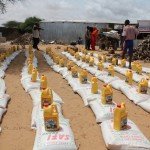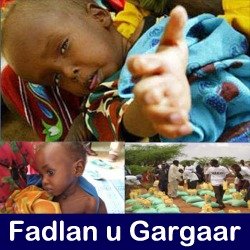 During a joint visit with President Jerry Rawlings today
During a joint visit with President Jerry Rawlings today
to a camp for displaced Somalis, Deputy Prime Minister and Minister of Defense H. E.
Abdihakim Fiqi called attention to the fundamental causes of the famine that has hit the people
of the war-torn country. He highlighted what his government is doing for the country but also
outlined the fragility of the state and the enduring conflict which hinders the provision of basic
services.
Twenty years of conflict have devastated the state institutions of Somalia. Nine thousand troops
from the African Union Mission for Somalia are supporting the Transitional Federal Government
as it seeks to defeat an Al Qaeda-linked insurgency, design a constitution for all the Somali
people and transition the country to full sovereignty.
Halkan kadaawosawiradii oo dhamaystiran
Within two days of being sworn in as the new Prime Minister of the Transitional Government, Dr
Abdiweli Mohamed Ali, established an emergency National Humanitarian Committee to direct
the government’s response to the humanitarian crisis in the country. Shortly after being
appointed the Prime Minister met with key UN agencies and continues to work with the UN
Office for the Coordination of Humanitarian Affairs to help the delivery of aid in Somalia.
The Committee, led by the Deputy Prime Minister, has initiated a global appeal to draw
attention to the plight of Somalis. The Committee established a camp in Dharkinlay, south west
of Mogadishu, where it is allocating shelter for displaced people arriving in the city. The
government has established sanitation and clean drinking water for the 4,000 displaced people
who have arrived so far.
halkan ka akhris warkoo PDF ah
Together with the Mayor of Mogadishu, the Committee has delivered food and basic items to
the camp. Through the Committee, the government has committed $500,000 of emergency aid.
In total food, shelters, blankets and other non-food items have been provided to displaced
people in eight of the sixteen IDP camps in the capital.
Responding to today’s announcement by the UN of a famine in Somalia, Deputy Prime Minister
and Chairperson of the Committee said: “I – and on behalf of the Somali people – are
immensely grateful to those UN agencies and all the people, the NGOs, who are helping on the
ground. We welcome the delivery of much needed aid in the Baidoa region and elsewhere in
Somalia, and urge those who have blocked life-saving aid for too long do everything in their
power now to deliver food to those who are suffering.”
“The plight of the Somali people is desperate. I saw with my own eyes today the suffering of
my people right in the heart of our capital, in the camp we established for those who need our
help. But as thousands more Somalis flood into these safe, government-controlled areas of
Mogadishu we call upon all international partners to step up their support.”
The Committee has also been working with the media and international media partners to
highlight the appeal and the bank account it has set up. The Somali Diaspora have donated
generously and the first International aid agencies, Qatar charity has provided emergency
supplies.
Prime Minister Dr Abdiweli Mohamed Ali said,
“Today the world’s attention is on my country but I ask the world to address the fundamental
causes of this humanitarian catastrophe and urgently ask for the resources needed to rebuild
the Somali state in the midst of an ongoing conflict. I am determined to see the country be able
to look after its own people but we will need committed international support to do so.
“This is going to get worse for the Somali people, before it gets better.”
E-mail: ayarisow@opm.gov.so Mogadishu, Somalia




































comment closed after 30 days / Jawaabaha waa la xiray ama waa la joojiyay wixii ka badan 30 cisho.